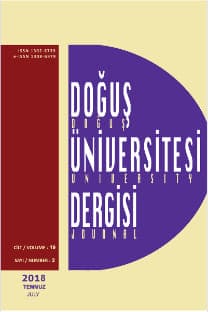GRAVITY ANOMALY SEPARATION USING 2-D WAVELET APPROACH AND AVERAGE DEPTH CALCULATION
Dalgacık, Gravite anomalisi, Güç spekturum analizi
GRAVITY ANOMALY SEPARATION USING 2-D WAVELET APPROACH AND AVERAGE DEPTH CALCULATION
Wavelet, Gravity Anomaly, Power Spectrum Analysis,
___
- ABDELRAHMAN, E.M., A.I., BAYOUMI, H.M. EL-ARABY. (1991), "A l e ast squares minimization approach to invert gravity data”, Geophysics, 56, 115-118
- AGARWAL, B.N.P., AND LAL, L.T. (1971), "Application of rational approximation in the ca lc u latio n of the second deriv ativ e of the g ravity field", Geophysics, 36, 571-581.
- A. SPECTOR AND F. S. GRANTI. (1970), "Statistical models for interpreting aeromagnetic data", Geophysics, 35, 293-302.
- BHATTACHARRYYA, B.K., AND NAVOLIO,M.E.(1976), "A Fast Fourier Transform method for rapid computation of gravity and magnetic anomalies due to arbitrary bodies",Geophysics, Prosp., 20, 633-649.
- CHAN Y.T. (1996), "Wavelet Basics",Kluwer Academic Publishers, USA.
- DAUBECHIES,I. (1990), "The Wavelet Transform, Time-Frequency Localization and Signal Analysis", IEEE Trans. On Information Theory, 36.
- E. ISING, (1925), "Zeitschrift Physik", 31, 253.
- GABOR, D. (1946), "Theory of Communications", J.IEEE, 93, 3, 429.
- GRIFFIN, W.P. (1989), "Residual gravity in theory and practice", Geophysics, 14, 39-56.
- GROSSMAN,A.,MORLET,J. (1985), " Mathematics and Physics", 2, L. Streit, Ed., World Scientific Publishing, Singapore.
- MALLAT, S. (1989), "A Theory for Multiresolution Signal Decomposition the Wavelet Representation", IEEE Trans. Pattern Anal. And Machine Intelligence, 31, 679-693.
- PALACKY, G.J.(1986), "Geological background to resistivity mapping, in, Ed., Palacky, G.J., Airborne resistivity mapping",G.S.C. Paper 86-22,19-27.
- PICK, M., PICHA,J., AND VYSKOCIL, V. (1973), "Theory of Earth’s gravity field", Academia
- R.S.PAWLOWSKI, AND R.O. HANSEN, (1990), "Gravity anomaly separatiin by Wiener filtering", Geophysics , 55, 539-548.
- RICHARD C. DOBES, ANIL JAIN, (1989), "Random field models in image analysis", Journal of Applied Statistics, 16, 131-162.
- SHU-KUN HSU, JEAN-CLAUDE S., AND CHUEN-TIEN S. (1996), "High resolution detection of geological boundaries from potential-field anom alies; An enhanced analytical signal technique", Geophysics, 61, 373-386.
- VACLAC B., JAN H., AND KARELS. (1992), "Linear filters for solving the direct problem of potential fields", Geophysics, 57, 1348-1351.
- WATSON, K., (1985), "Remote sensing: A geophysical perspective",Geophysics. 55, 843-850.
- YAOGUO LI., AND DOUGLES W. O. (1998), "Separation of regional and residual magnetic field data",Geophysics, 63, 431-439.
- ISSN: 1302-6739
- Yayın Aralığı: 2
- Başlangıç: 2000
- Yayıncı: Doğuş Üniversitesi
A. Muhittin ALBORA, Osman Nuri UÇAN
Martin ZIARATI, Osman Nuri UÇAN, Reza ZIARATI
PARAMETRELERİ DEĞİŞKEN DC SER VOMOTOR İÇİN PI TİPİ PARAMETRİK ANLAMDA DAYANIKLI DENETLEYİCİ TASARIMI
Şeref Naci ENGİN, İbrahim Beklan KÜÇÜKDEMİRAL, Galip CANSEVER
GRAVITY ANOMALY SEPARATION USING 2-D WAVELET APPROACH AND AVERAGE DEPTH CALCULATION
A. Muhittin ALBORA, Osman Nuri UÇAN
ANTAGONIST CHARACTERS IN THE EARL Y GOTHIC NOVEL: A MATTER OF POLITICAL ANXIETY?
